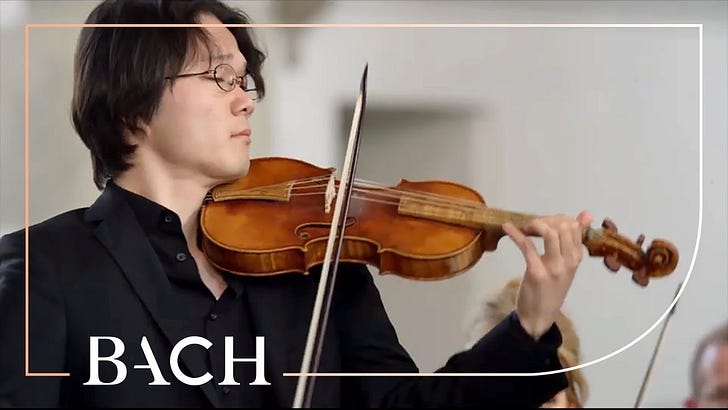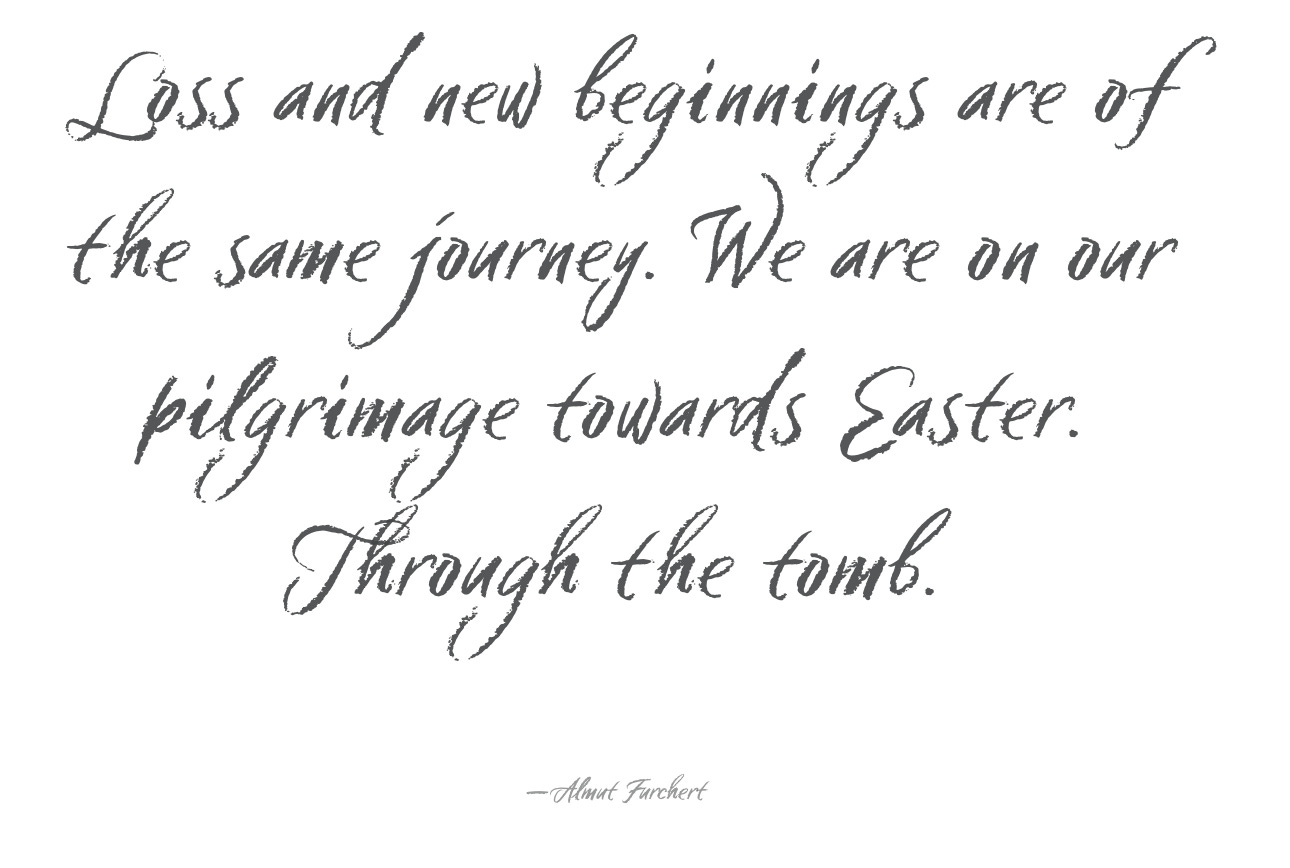Maundy Thursday: Come to the table!
Remembering the cross is no morbid enterprise. Instead it is the school of com-passion our heart needs the most.
'Erbarme dich, mein Gott' from 'St Matthew Passion' (BWV 244) by J.S. Bach. Performed by the Netherlands Bach Society conducted by Jos van Veldhoven. Soloists: Tim Mead (Alto), Shunske Sato (violin).
39. Arie (Alt I)
Erbarme dich, mein Gott,
um meiner Zähren willen!
Schaue hier,
Herz und Auge weint vor dir bitterlich.
39. Aria
Have mercy, Lord, on me,
Regard my bitter weeping,
Look at me, heart and eyes
Both weep to Thee bitterly.
Dear fellow pilgrim,
Bach’s aria “Erbarme Dich” (Have mercy, o God") in his St Matthew Passion is probably the most famous and beloved of the arias. Today I invite you to take refuge in this plea for mercy with one of the most beautiful interpretations I have ever heard, and the angelic earnestness of the male Alto Tim Mead and the Netherlands Bach Society. Do listen first, before reading on.
Towards Compassion
In the liturgical year, Holy Thursday is the first day of the Easter Triduum and the high point of Holy Week. It often starts with the ritual of washing feet during the Mass of the Lord's Supper, reminding us of Divine love bending deep into our human existence giving itself fully without ever exhausting itself.
I came across a
piece on Maundy Thursday in which she ponders, whether the communion around the table, the supper, is the most important event in the Passion story:What if Maundy Thursday was that? The Last Supper of the Old World. The last meal under Rome, the last meal under any empire. And it is the First Feast of the Kingdom That Has Come. The first meal of the new age, the world of mutual service, reciprocity, equality, abundance, generosity, and unending thanksgiving. Pass the cup, keep it going, hand to hand, filled and refilled, time after time. This night is the final night of dominion, the end of slavery; and this night is the first night of communion, the beginning of true freedom: “I will no longer call you servants but friends.”
What if Holy Thursday is the beginning of healing, dear friend?
So, imagine, pulling up a chair, and sitting down at our supper table together sharing food and wine, stories and communion.
How have you been doing, dear fellow pilgrim?
Some of you may have started out walking the walk, going through the motions, and some of you might have felt the power of resistance which wants us to turn to other “more important” things.
So let’s remind ourselves, dear fellow pilgrims, what we have been setting out to do:
In our passion journey we are following the movement of our soul from passion to compassion and from lament to the hope of mercy and new life. Layer for layer we come closer to love eternal who wants to dwell in our heart. One fellow traveler has written that this peeling of self feels like snow melting - very slowly.
On Palm Sunday, we introduced this Aria, “Erbarme Dich / Have Mercy,” to you the first time, in its haunting interpretation by Marian Anderson on the stoops of the Lincoln Memorial, as a ritual expression of grief and longing that can break through our resistance.
Bach has written it as a gift, to himself and the world. For me it is the most heartbreaking and the most needed every Passion season. And thus, I always come back to it. Bach has placed this Aria in his Passion story right after the scene when Peter cries bitterly about his betrayal. This is how Peter came to the first Passion week. And found mercy for his grief. It is a balm also to our own experiences of betrayal or failure or short comings or melt downs. It is the door to Good Friday. And to Easter.
The music embodies the recurring, haunting, cyclical intertwining of our human grief and the eternal compassion that enfolds us. It is a vessel that can hold Peter’s vast grief and bitter, desolate tears, as well as our own. It invites that despairing self gently, with compassion, into weeping to God. It invites us, it joins us together, to weep to God. It is the round, open, welcoming, door to Good Friday. And the bridge that spans the vast emptiness of Holy Saturday to lead us to Easter.
And it invites us into communion, to come as we are and to share grace.
So come as you are, dear friend, with your longings, your resistance, your hope and your grief, your stumbling and unbelief. Bring your open heart to the table of compassion this Aria offers.
Listening Practice
What is left for us to do is to listen, again, and another time to our hearts and to this Aria. To take in the melancholic dance of the violin, the angelic voice of the alto, the expressive postures of the musicians, the repetition of the plea “Erbarme Dich, mein Gott… / miserere mei Deus / Have mercy, my God, with me” or as it is probably best literally translated “Pity me, my God” - - if we understand pity as compassion as we find it in the German verb “erbarmen."
Listen.
Listen with the ear of your heart. Chew on the lyrics, eat the scroll. Taste the purity and the subtle blending of the emotion. Follow the movement of the spirit, which transmutes our passion into compassion, into communion.
Be present.
Take every note, every movement, every word to heart. Hold it dear, as you would the beloved. Enter the sacred space where our tears become rain drops, falling softly on fertile ground. Let your heart be moved to open up and to trust that God’s grace is waiting for you. Right here, among us and with us. That you are among fellow travelers, friends of each other and of God.
Come as you are.
With fear or trembling, with helplessness or speechlessness, with worries or anxieties, with failures or regrets, with anger or frustration. Come with your struggles, with the burden of the world’s pain, besieged by disease, unfaithful leaders, unending war, and twisted truth. Come with your hopes and your longings.
Trust
Trust that you will find Divine Mercy in the depth of your heart, where pain and bliss intermingle. Where the Divine wants to make its dwelling place again and again.
Listen and listen again.
Flee into Grace. Regularly take in this remedy against despair. It gains in strength with repetition, this medicine of the Divine healer. Let the music be a balm for your trembling heart.
Share
Do not stay alone in your sorrows. Hold them before Divine mercy. Join our communion of fellow pilgrims. Break bread with us. Let us enter this sacred space of Divine compassion together. Where Christ’s passion turns us to compassion. Bring with you the sorrows of the world and your own which lay heavy on your shoulders and hold them up into our shared plea for mercy.
What are you bringing to this table, dear friend?
Keep reading with a 7-day free trial
Subscribe to Cloister Notes to keep reading this post and get 7 days of free access to the full post archives.






